Items filtered by date: October 2024
Podiatric Care for Pinky Toe Corns
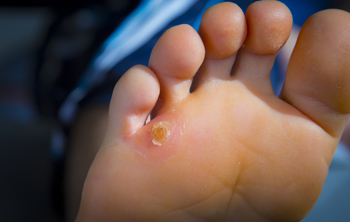
Corns on the pinky toe are thickened areas of skin that form in response to pressure or friction. They often develop on the outer side of the pinky toe due to constant rubbing against tight or ill-fitting shoes. Corns can be hard or soft, with hard corns typically forming on the bony areas, and soft corns appearing between toes where moisture is present. Symptoms include a hardened, raised bump that can be painful when pressed, redness, and irritation. The pain can intensify with continued friction, making walking uncomfortable. To prevent corns, wear properly fitting shoes with a wide toe box and cushioned insoles. Regularly moisturizing and using a pumice stone on your feet can also help keep the skin soft. If you have a painful or infected corn on any toe, it is suggested that you visit a podiatrist who can provide care, which might include shaving or safely removing the corn.
Corns can make walking very painful and should be treated immediately. If you have questions regarding your feet and ankles, contact Mark Poplawski, DPM of Jersey Shore Podiatry, LLC. Our doctor will treat your foot and ankle needs.
Corns: What Are They? And How Do You Get Rid of Them?
Corns are thickened areas on the skin that can become painful. They are caused by excessive pressure and friction on the skin. Corns press into the deeper layers of the skin and are usually round in shape.
Ways to Prevent Corns
There are many ways to get rid of painful corns such as:
- Wearing properly fitting shoes that have been measured by a professional
- Wearing shoes that are not sharply pointed or have high heels
- Wearing only shoes that offer support
Treating Corns
Although most corns slowly disappear when the friction or pressure stops, this isn’t always the case. Consult with your podiatrist to determine the best treatment option for your case of corns.
If you have any questions please feel free to contact our office located in Toms River, NJ . We offer the newest diagnostic and treatment technologies for all your foot and ankle needs.
Ankle and Foot Arthropathies
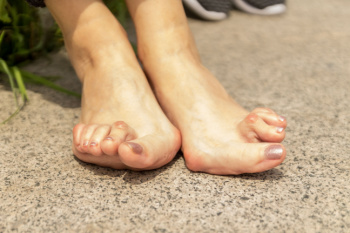
Ankle and foot arthropathies refer to joint diseases that affect the ankle and foot. These conditions can cause pain, swelling, stiffness, and limited movement. Common types include osteoarthritis, rheumatoid arthritis, and gout. Osteoarthritis occurs when the cartilage between bones wears down, causing discomfort. Rheumatoid arthritis is an autoimmune disease where the body's immune system attacks the joints, and can be quite uncomfortable. Gout results from a buildup of uric acid crystals in the joints, leading to sudden pain and swelling. Treatment typically involves rest, and depending on the severity of the condition, targeted stretching, and medications to reduce pain and inflammation. In some cases, surgery is required. Wearing supportive shoes or using orthotics can also help relieve pressure on the joints. If you are experiencing persistent foot or ankle pain, it may indicate arthritis, and it is suggested that you consult a podiatrist for an accurate diagnosis and treatment plan.
Because RA affects more than just your joints, including the joints in your feet and ankles, it is important to seek early diagnosis from your podiatrist if you feel like the pain in your feet might be caused by RA. For more information, contact Mark Poplawski, DPM of Jersey Shore Podiatry, LLC. Our doctor will assist you with all of your podiatric concerns.
What Is Rheumatoid Arthritis?
Rheumatoid Arthritis (RA) is an autoimmune disorder in which the body’s own immune system attacks the membranes surrounding the joints. Inflammation of the lining and eventually the destruction of the joint’s cartilage and bone occur, causing severe pain and immobility.
Rheumatoid Arthritis of the Feet
Although RA usually attacks multiple bones and joints throughout the entire body, almost 90 percent of cases result in pain in the foot or ankle area.
Symptoms
- Swelling and pain in the feet
- Stiffness in the feet
- Pain on the ball or sole of feet
- Joint shift and deformation
Diagnosis
Quick diagnosis of RA in the feet is important so that the podiatrist can treat the area effectively. Your doctor will ask you about your medical history, occupation, and lifestyle to determine the origin of the condition. Rheumatoid Factor tests help to determine if someone is affected by the disease.
If you have any questions please feel free to contact our office located in Toms River, NJ . We offer the newest diagnostic and treatment technologies for all your foot and ankle needs.
Various Causes of Heel Pain
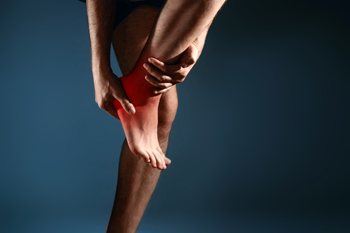
Heel pain is a common problem that can arise from various conditions. One frequent cause is plantar fasciitis, which involves inflammation of the thick tissue band along the bottom of the foot, leading to sharp pain near the heel. Bursitis, another issue, occurs when the fluid-filled sacs cushioning the heel become inflamed, often due to repetitive stress. Heel spurs are bony growths on the underside of the heel, and they can form from long-term strain on the foot's muscles and ligaments. Additionally, a pump bump is a bony enlargement at the back of the heel caused by pressure from shoes. Achilles tendonitis, characterized by inflammation of the Achilles tendon, usually results from overuse or tight calf muscles. To diagnose heel pain, a healthcare provider will typically conduct a physical exam, review your medical history, and recommend imaging tests like X-rays or MRIs. Treatment options often include rest, stretching exercises, orthotic devices, and anti-inflammatory medications. If you experience persistent heel pain, it is suggested you make an appointment with a podiatrist for an accurate diagnosis and tailored treatment plan.
Many people suffer from bouts of heel pain. For more information, contact Mark Poplawski, DPM of Jersey Shore Podiatry, LLC. Our doctor can provide the care you need to keep you pain-free and on your feet.
Causes of Heel Pain
Heel pain is often associated with plantar fasciitis. The plantar fascia is a band of tissues that extends along the bottom of the foot. A rip or tear in this ligament can cause inflammation of the tissue.
Achilles tendonitis is another cause of heel pain. Inflammation of the Achilles tendon will cause pain from fractures and muscle tearing. Lack of flexibility is also another symptom.
Heel spurs are another cause of pain. When the tissues of the plantar fascia undergo a great deal of stress, it can lead to ligament separation from the heel bone, causing heel spurs.
Why Might Heel Pain Occur?
- Wearing ill-fitting shoes
- Wearing non-supportive shoes
- Weight change
- Excessive running
Treatments
Heel pain should be treated as soon as possible for immediate results. Keeping your feet in a stress-free environment will help. If you suffer from Achilles tendonitis or plantar fasciitis, applying ice will reduce the swelling. Stretching before an exercise like running will help the muscles. Using all these tips will help make heel pain a condition of the past.
If you have any questions please contact our office located in Toms River, NJ . We offer the newest diagnostic and treatment technologies for all your foot and ankle needs.
Heel Pain Can Be Treated!
What are Heel Spurs?
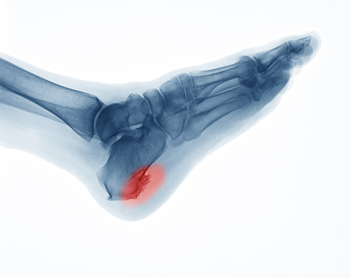
Bone spurs, or osteophytes, are bony growths that can develop on the heel due to excessive stress, injury, or conditions like plantar fasciitis. These spurs typically form where tendons and ligaments attach to the bone, causing localized pain and discomfort. Symptoms of heel bone spurs include sharp or aching pain, especially with the first steps in the morning or after prolonged periods of rest. Swelling and inflammation surrounding the heel may also be present. Relief often involves a combination of approaches to alleviate pain and reduce inflammation. This can include wearing supportive footwear, using custom orthotics, and resting the affected area. Stretching exercises may also be beneficial. In more severe cases, corticosteroid injections or surgery might be necessary. To address heel pain and explore effective treatments, it is suggested you schedule an appointment with a podiatrist who can provide tailored care for your condition.
Heel spurs can be incredibly painful and sometimes may make you unable to participate in physical activities. To get medical care for your heel spurs, contact Mark Poplawski, DPM from Jersey Shore Podiatry, LLC. Our doctor will do everything possible to treat your condition.
Heels Spurs
Heel spurs are formed by calcium deposits on the back of the foot where the heel is. This can also be caused by small fragments of bone breaking off one section of the foot, attaching onto the back of the foot. Heel spurs can also be bone growth on the back of the foot and may grow in the direction of the arch of the foot.
Older individuals usually suffer from heel spurs and pain sometimes intensifies with age. One of the main condition's spurs are related to is plantar fasciitis.
Pain
The pain associated with spurs is often because of weight placed on the feet. When someone is walking, their entire weight is concentrated on the feet. Bone spurs then have the tendency to affect other bones and tissues around the foot. As the pain continues, the feet will become tender and sensitive over time.
Treatments
There are many ways to treat heel spurs. If one is suffering from heel spurs in conjunction with pain, there are several methods for healing. Medication, surgery, and herbal care are some options.
If you have any questions feel free to contact our office located in Toms River, NJ . We offer the latest in diagnostic and treatment technology to meet your needs.
Fabry Disease and the Feet
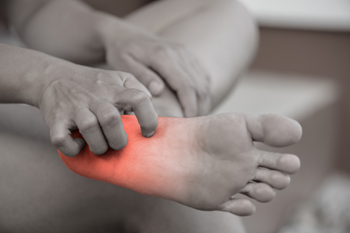
Fabry disease is a rare genetic disorder caused by the buildup of a fat-like substance called globotriaosylceramide due to a deficiency of the enzyme alpha-galactosidase A. This buildup affects various parts of the body, including the heart, kidneys, nervous system, and skin. In terms of foot involvement, Fabry disease can cause burning pain, tingling, and numbness, primarily due to nerve damage, or neuropathy in the feet. This discomfort often becomes worse by physical activity or heat. Diagnosis involves blood tests to measure enzyme levels, genetic testing to confirm mutations, and tissue biopsies to detect GL-3 accumulation. Early diagnosis is imperative as symptoms can progress. If you have foot discomfort or neuropathy, it is strongly suggested that you schedule an appointment with a podiatrist for a proper diagnosis and treatment to help relieve symptoms.
When dealing with systemic disease of the feet, it is extremely important to check the affected areas routinely so that any additional problems are caught quickly. If you have any concerns about your feet and ankles contact Mark Poplawski, DPM from Jersey Shore Podiatry, LLC. Our doctor will assist you with all of your podiatric needs.
Systemic Diseases of the Feet
Systemic diseases affect the whole body, and symptoms usually are displayed in the feet. This condition can make a patient’s ability to walk unbearable. Systemic diseases include gout, diabetes mellitus, neurological disorders, and arthritis.
Gout – is caused by an excess of uric acid in the body. Common symptoms include pain, inflammation, and redness at the metatarsal/phalangeal joint of the base big toe. Gout can be treated by NSAIDs to relieve pain and inflammation, and other drugs that lower the acid levels in the body.
Diabetes mellitus – is an increase in the level of blood sugar that the body cannot counteract with its own insulin. Failure to produce enough insulin is a factor in Diabetes.
Diabetes of the Feet
Diabetic Neuropathy – may lead to damaged nerves and affect the feet through numbness and loss of sensation.
Peripheral Vascular Disease – can restrict the blood flow to the feet, and often times lead to amputation of the feet.
If you have any questions please feel free to contact our office located in Toms River, NJ . We offer the newest diagnostic and treatment technologies for all your foot and ankle needs.





